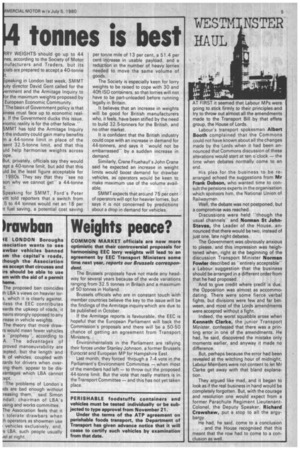WESTM NSTER HAUL
Page 7

If you've noticed an error in this article please click here to report it so we can fix it.
AT FIRST it seemed that Labour MPs were going to stick firmly to their principles and try to throw out almost all the amendments made to the Transport Bill by that effete group, the House of Lords.
Labour's transport spokesman Albert Booth complained that the Commons could not have known about all the changes made by the Lords when it had been announced that Commons discussion of these alterations would start at ten o'clock — the time when debates normally come to an end.
His plea for the business to be rearranged echoed the suggestions from Mr Frank Dobson, who wanted time to consult the pensions experts in the organisation which sponsors him, the National Union of Railwaymen.
Well, the debate was not postponed, but a compromise was reached.
Discussions were held "though the usual channelsand Norman St JohnStoves, the Leader of the House, announced that there would be two, instead of just one, late night debates.
The Government was obviously anxious to please, and this impression was heightened when, right at the beginning of the discussion Transport Minister Norman Fowler described as "entirely acceptablea Labour suggestion that the business should be arranged in a different order from that he had proposed.
And to give credit where credit is due, the Opposition was almost as accommodating. There were some fierce verbal fights, but divisions were few and far between, and most of the Lords amendments were accepted without a fight.
Indeed, the worst squabble arose when Kenneth Clarke, the junior Transport Minister, confessed that there was a printing error in one of the amendments. He had, he said, discovered the mistake only moments earlier, and anyway it made no difference.
But, perhaps because the error had been revealed at the witching hour of midnight, Labour Members were not content to let Mr Clarke get away with that bland explanation.
They argued like mad, and it began to look as if the real business in hand would be completely forgotten. But, with the courage and resolution one would expect from a former Parachute Regiment LieutenantColonel, the Deputy Speaker, Richard Crawshaw, put a stop to all the argybargy.
He had, he said, come to a conclusion . and the House recognised that this meant that the row had to come to a conclusion as well.












































































































































































































